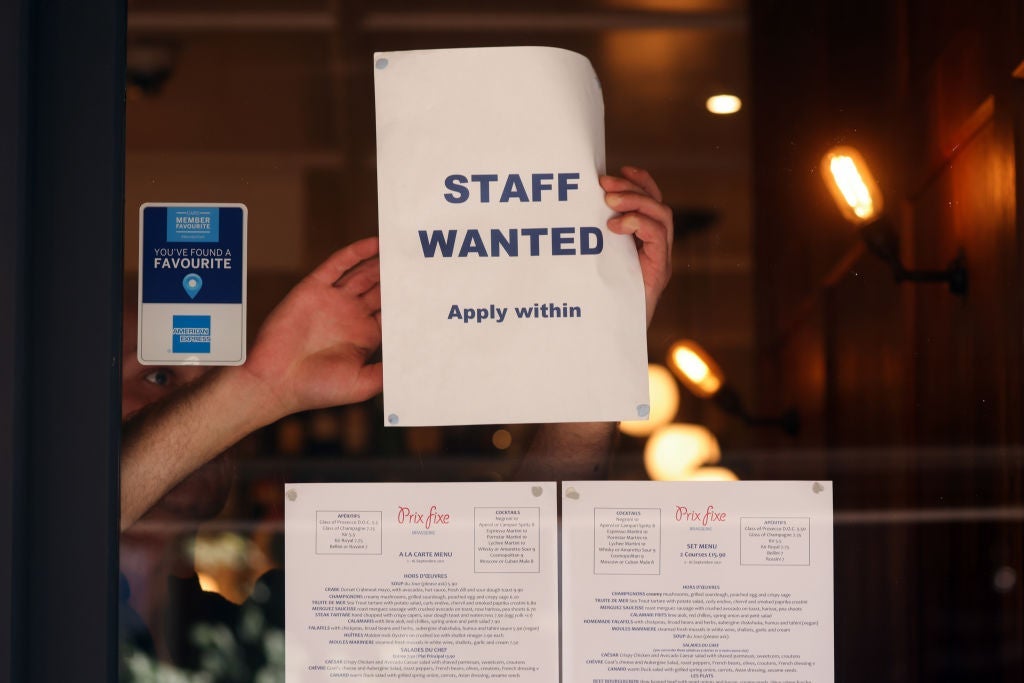

In the UK, significant labour shortages are expected to continue over the next two years. As a result, the UK’s economic recovery from Covid-19 looks set to be considerably slowed.
The Confederation of British Industry (CBI) – a business lobby group – has called on UK government ministers to stop “waiting for shortages to solve themselves”, pushing them to take action on issues such as foreign worker visas.
We’re hiring…
In the UK, job vacancies hit a record high of 953,000 in the three-month period ending in July 2021, according to the Office for National Statistics. In fact, the latest figures reported by the Recruitment and Employment Confederation (REC) show that by the end of August 2021, these vacancies soared to 1.66 million, with little sign of decreasing in the coming months.
There had been hope that the conclusion of the UK government's furlough programme at the end of September 2021 would ease some of the labour shortages. However, many experts believe that the impact on job vacancies will be small.
Matthew Percival, director of people and skills at the CBI, says: “[The impact of furlough ending] is a very complicated picture geographically… For example, there are jobs that are dependent on commuters being in their offices in London. A number of those are still more likely to be furloughed than sectors such as retail and hospitality for the country. So, you have got some geographical impacts for who is still on furlough. As a result, there is a risk of unemployment rising in some places but not necessarily in the places where the vacancies are.”
Alongside its reporting of the high vacancy numbers, the REC advised that reskilling would be crucial to addressing the shortage.
Claire Warnes, partner and head of education, skills and productivity at KPMG, was quoted in the REC report as saying: “We need action from businesses and government to reskill and upskill furloughed and prospective workers now more than ever, as the increasing skills gap in the workforce has the potential to slow the UK’s economic recovery.”
Hospitality hit hardest in UK labour shortage
Sectors experiencing the shortages most acutely include entertainment, hospitality and service-based industries.
Investment Monitor’s chief economist, Glenn Barklie, says: “For sectors that have been heavily impacted by the labour shortage, typically they are industries which require a lot more safety measures [due to Covid-19]. These are the sectors that felt that initial and deep impact during the pandemic. So, it is not unusual that they are taking the longest length of time to recover.”
Percival is careful not to lay blame solely on the Covid-19 pandemic. “We had some labour shortages predating Covid-19," he says. "Let's not forget the example of the HGV drivers. There was a shortage of approximately 60,000 drivers before the pandemic hit.”
Percival believes that for the UK, there have been myriad issues creating this shortage, as well as bad timing. “We have had a number of really large impacts on the labour market all coming at once," he says. "We have had Brexit… and the immigration system that was due to be changing in January 2021. That was obviously so far down the list of the country's priorities given the pandemic.”
Where did the UK's workers go?
With the dual-impact of the Covid-19 pandemic and Brexit, the largest withdrawal of EU workers from the UK labour force came between October and December in 2020.
Percival explains: “[Businesses said to us that] they knew they needed to make big changes in workforce models to respond to Brexit. They were planning for how to do so, but many were banking on more EU workers staying in the UK for longer to allow for adjustment because they had their EU settled status. However, the pandemic meant many left. At the same time, businesses expected to be training more people over the past year, but Covid was disrupting their ability to be training new people to bring them into these industries.”
The Occupational Shortage list
Alongside its reporting of the labour shortages, the CBI has outlined simple steps that could help the UK alleviate its labour shortage problem. First, updating the Shortage Occupation list to allow more workers from abroad (including the EU).
Percival thinks the UK government is being too slow to respond to this solution, saying: “It has been some time since that list was updated. The migration advisory committee made some recommendations for updating it in September 2020, but the government did not accept them, saying that the labour market was in flux too much at that time. There isn't actually a plan for the migration advisory committee to come up with any new recommendations to even start that process until April 2022.”
The CBI is calling for the government to accept the recommendations put forward in September. Percival says: “We should immediately start the process of doing another thorough review so we can get something more up to date. That process takes some time, so we have a long gap in which businesses will continue to experience shortages.”
Investors always look at the bigger picture and they will be looking at this as a short-term issue. Glenn Barklie, Investment Monitor
Does it impact investment?
How will these labour shortages impact investors? The sectors topping the vacancy chart aren’t typically targets for foreign direct investment but they do have indirect impacts on quality of life.
Barklie explains the investors' point of view. “Investors always look at the bigger picture and they will be looking at this as a short-term issue," he says. "This is because everyone understands the impact of Covid and how it has been affecting their businesses. These investors will be experiencing similar problems in other countries as well and within their own companies.”
There is, however, an increased emphasis on ironing out the skills gap that predates the labour shortage headlines, according to Barklie. “Talent will continue to be the key driver for investment," he says. "With things such as [industry 4.0 and advanced technology], there is this transition that is going on throughout the world, and the UK being a developed economy is putting more of its resources into the skills side of things.”
A deepened focus on relocating unemployed workers into training programmes to bolster the UK’s talent pool will prove crucial to the country’s economic recovery, even though labour shortages and upskilling workforces are global issues that are not exclusive to the UK.







